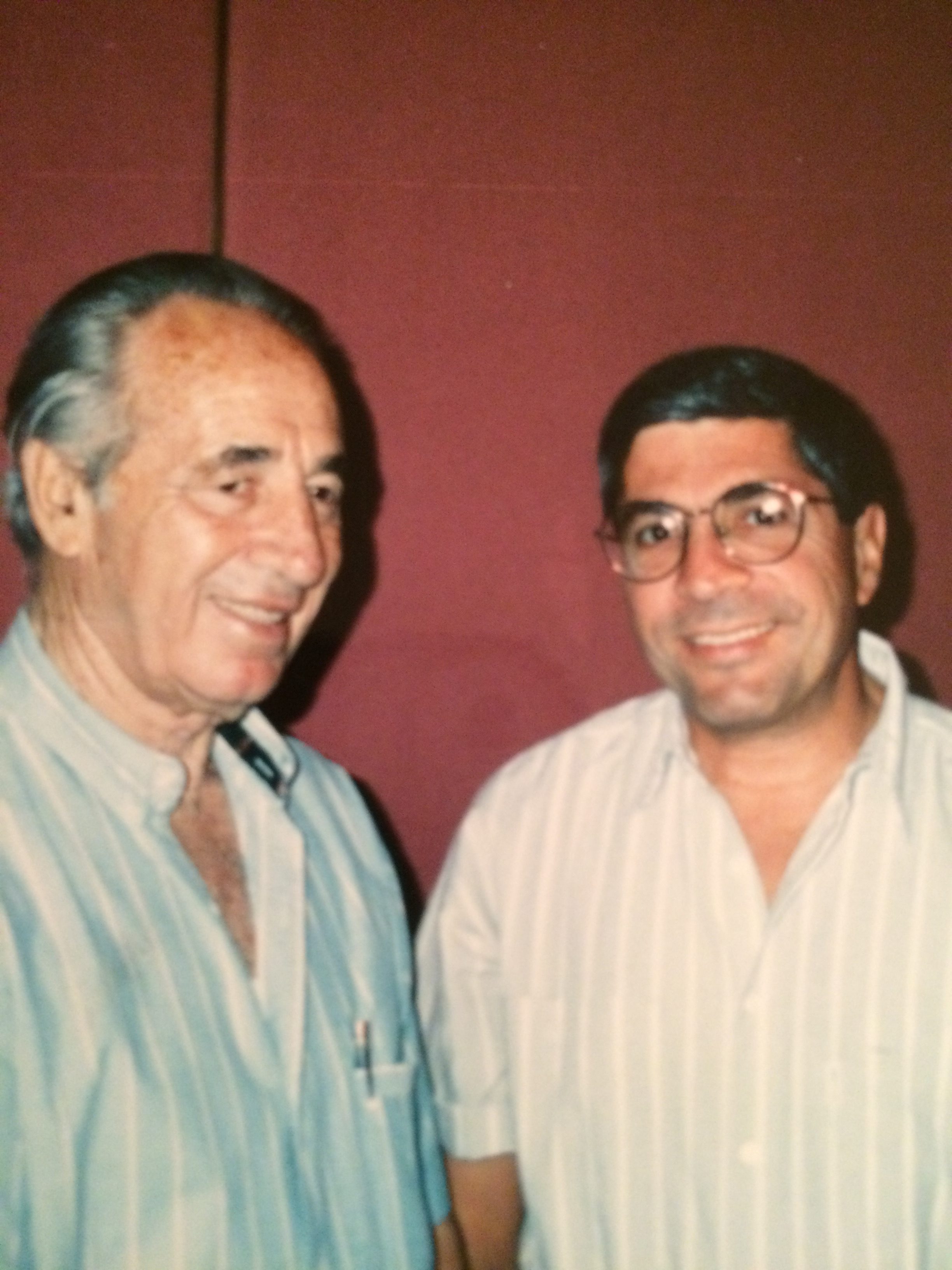
(Shimon Peres & me, Jerusalem, August, 1991)
I first met Shimon Peres 25 years ago last month, as part of a small group of public officials on a fact-finding mission to Israel, sponsored by New York’s Jewish Community Relations Council. Peres, then Chairman of the out-of-power Israeli Labour Party and a member of the Israeli Knesset, talked passionately with us about peace and democracy for nearly an hour.
Speaking freely on the day before Mikhail Gorbachev returned to power during a tumultuous time in the Soviet Union, Peres schooled us in history happening before our eyes, not far from the classroom where me met, in Jerusalem:
“ I don’t believe in reincarnation: what is dead is dead. The greatest ideological battle of our time has been between democracy and communism and democracy won. The apparatchiks have neither the means nor the promise to bring back the old ways. They can’t make Russia great again; they can’t make food grow overnight…”
Then Shimon Peres, looked squarely at each one of us, underscoring every word:
“ The Russians were able to sacrifice freedom and unable to create equality; they wanted to enrich everybody—instead, they impoverished everybody; they wanted to create a classless society; instead, they created a governing class with special privileges; they wanted to create a people with a nation, only to see nationalism still in existence. After 70 years of sacrifice, they discovered they couldn’t compete with the United States. Instead, they created a double hunger: for food and for freedom.”
Someone in our group, asked Peres about the prospects for peace in the Middle East, since he was so closely identified with the effort to achieve it:
“Who wants today to copy Russia? Who copies a failure? The three basic problems in Israel’s future are: 1) We must achieve peace before the Middle East goes nuclear; 2) We must keep Israel from becoming a bi-national state. We may end up keeping the territories as Likud wants, but losing our country. What makes a country is not land, but people. We don’t want to dominate others. Who is a hero? The one who dominates himself; 3) Economic Problems: we cannot live forever on aid of the U.S. Right now, world markets are more important; dangers and opportunities are regional, not national. We cannot solve our problems without reorganizing our water sources.”
Peres was preaching now, his soul on fire:
“We should combine the oil of the Saudis, with the water of Turkey and the know-how of Israel to build a common market. For us, the way the peace will wind up is more important than how it will be obtained. For us, it is a matter of life and death; the only option we have is to become a medical center for the region, a technological center for the region, what with the number of Soviet doctors and engineers coming to Israel. We shall have to give back the territories—they should be demilitarized. They would run their lives without our intervention, such as Gaza. Jerusalem would have to remain united. We have to work toward a regional economy with regional solutions…The motivation for the Palestinian conflict may disappear if it’s solved along the lines I have suggested.”
Peres’ bright eyes sparkled as he spoke to us, outlining his plan for peace throughout the region. He noted that Israel did not have territorial issues with Eqypt or Jordan, but only with Syria, over the Golan Heights, which, he noted, “was not a holy place.”
I asked Peres to suggest some alternatives for dealing with the Golan and Gaza.
“I’m not in the mood to enter into negotiations, “ Peres said. “When we start negotiations, then we’ll see. One day, Saddam Hussein will disappear. Our enemies are not the people, nor a religion. We must judge the land by its’ people. What is Gaza? 80,000 acres and 800,000 people. For me, Gaza doesn’t belong to us; it belongs to the people who live there. I’d give back Gaza; I’d admit it is a fact of life—it is theirs. The same goes for the West Bank. We have to cut the geography in accordance with the demography. Both areas would have to be demilitarized.”
When he finished answering our questions, Shimon Peres, dressed in an open-necked, short-sleeved sport shirt that matched mine, came over to each of us, shook our hands and posed for photos. I told him I worked with Mario Cuomo and his eyes danced:
“ Please give the Governor my warmest regards,” Peres told me.
The following year, I accompanied Cuomo on his first trip to Israel, watching as the Governor and Peres embraced like two long lost brothers; marveling at how each resembled the other in voice, manner, gravitas and appearance.
Now, Mario Cuomo and Shimon Peres are both gone, and their lives challenge us to ensure that the kind of rational thinking, compassion and constructive, visionary solutions each sought, bloom forever, like trees in a desert irrigated by man and bathed in the divine light of love and human dignity.

